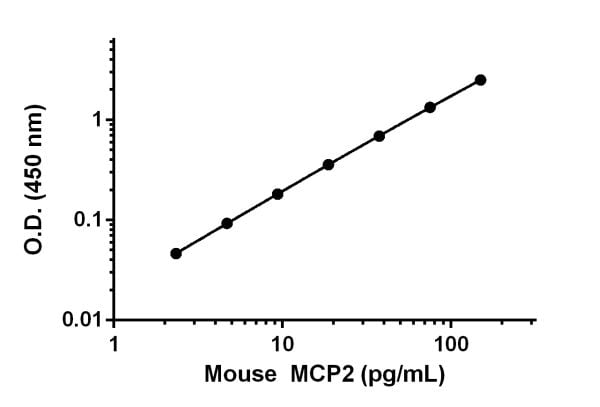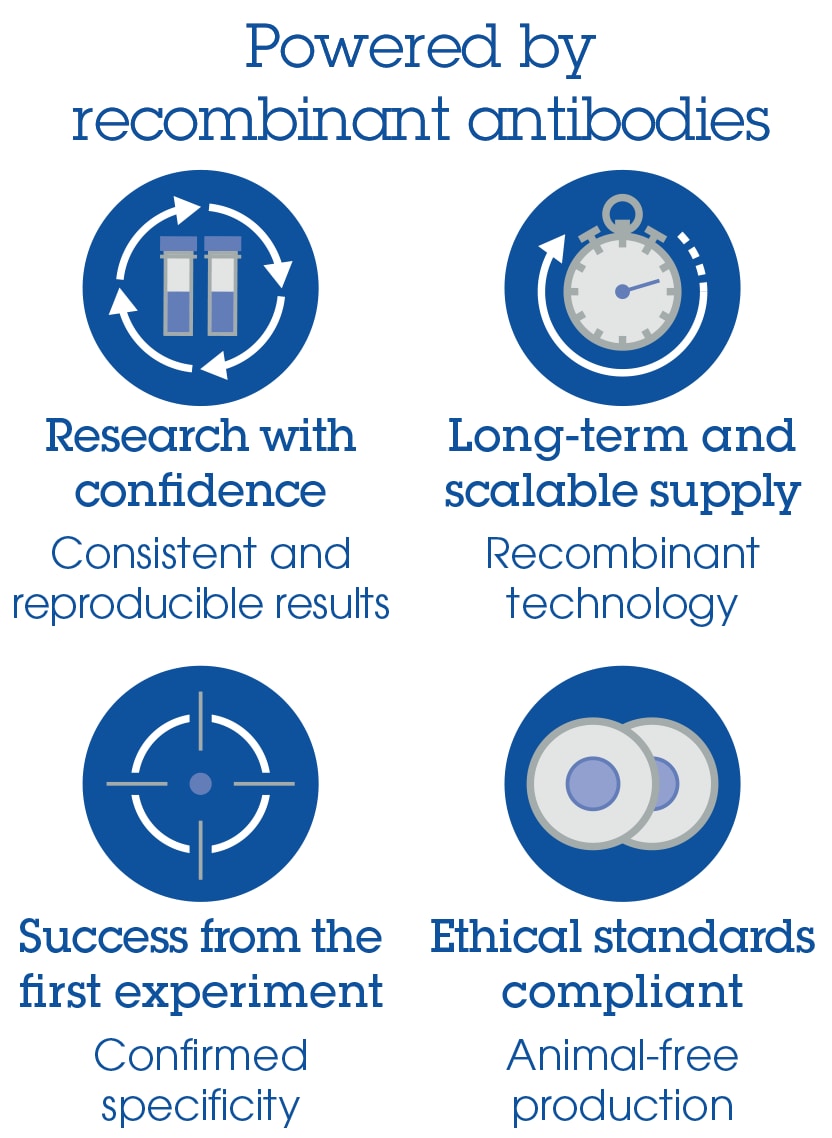Mouse MCP2 ELISA Kit (CCL8) (ab203366)
Key features and details
- One-wash 90 minute protocol
- Sensitivity: 1 pg/ml
- Range: 2.34 pg/ml - 150 pg/ml
- Sample type: Cell culture extracts, Cell culture supernatant, Cit plasma, EDTA Plasma, Hep Plasma, Serum
- Detection method: Colorimetric
- Assay type: Sandwich (quantitative)
- Reacts with: Mouse
Overview
-
Product name
Mouse MCP2 ELISA Kit (CCL8)
See all MCP2 kits -
Detection method
Colorimetric -
Precision
Intra-assay Sample n Mean SD CV% Overall 8 3.98% Inter-assay Sample n Mean SD CV% Overall 3 2.99% -
Sample type
Cell culture supernatant, Serum, Cell culture extracts, Hep Plasma, EDTA Plasma, Cit plasma -
Assay type
Sandwich (quantitative) -
Sensitivity
1 pg/ml -
Range
2.34 pg/ml - 150 pg/ml -
Recovery
Sample specific recovery Sample type Average % Range Serum 101 97% - 104% Cell culture media 84 82% - 86% Hep Plasma 99 90% - 103% EDTA Plasma 107 105% - 109% Cit plasma 108 108% - 110% -
Assay time
1h 30m -
Assay duration
One step assay -
Species reactivity
Reacts with: Mouse
Does not react with: Goat, Cow, Pig -
Product overview
Mouse MCP2 ELISA Kit (CCL8) (ab203366) is a single-wash 90 min sandwich ELISA designed for the quantitative measurement of MCP2 (CCL8) protein in cell culture extracts, cell culture supernatant, cit plasma, edta plasma, hep plasma, and serum. It uses our proprietary SimpleStep ELISA® technology. Quantitate Mouse MCP2 (CCL8) with 1 pg/ml sensitivity.
SimpleStep ELISA® technology employs capture antibodies conjugated to an affinity tag that is recognized by the monoclonal antibody used to coat our SimpleStep ELISA® plates. This approach to sandwich ELISA allows the formation of the antibody-analyte sandwich complex in a single step, significantly reducing assay time. See the SimpleStep ELISA® protocol summary in the image section for further details. Our SimpleStep ELISA® technology provides several benefits:
- Single-wash protocol reduces assay time to 90 minutes or less
- High sensitivity, specificity and reproducibility from superior antibodies
- Fully validated in biological samples
- 96-wells plate breakable into 12 x 8 wells stripsA 384-well SimpleStep ELISA® microplate (ab203359) is available to use as an alternative to the 96-well microplate provided with SimpleStep ELISA® kits.
-
Notes
MCP2 is a chemotactic factor that attracts monocytes. Chemokines and their receptors, in conjunction with adhesion molecules and their ligands, provide cues to enable tissue-specific homing of T cells in the steady state and during inflammation. Mouse MCP specifically induces migration of a population of recently activated, highly differentiated TH2 cells enriched in interleukin 5 (IL-5) and the IL-25 receptor (IL-25R), cytokines implicated in eosinophilic inflammation; as well as tumor necrosis factor (TNF) and OX40, molecules associated with inflammatory TH2 cells. Using a model of atopic dermatitis, we demonstrate a pathologic role for CCR8 and mouse CCL8, but not for the TH2-associated chemokine receptor CCR4 or the previously known mouse CCR8 chemokine ligand mouse CCL1 (TCA3), in mediating chronic cutaneous allergic inflammation.
Abcam has not and does not intend to apply for the REACH Authorisation of customers’ uses of products that contain European Authorisation list (Annex XIV) substances.
It is the responsibility of our customers to check the necessity of application of REACH Authorisation, and any other relevant authorisations, for their intended uses. -
Platform
Pre-coated microplate (12 x 8 well strips)
Properties
-
Storage instructions
Store at +4°C. Please refer to protocols. -
Components 1 x 96 tests 10X Mouse MCP2 (CCL8) Capture Antibody 1 x 600µl 10X Mouse MCP2 (CCL8) Detector Antibody 1 x 600µl 10X Wash Buffer PT (ab206977) 1 x 20ml 50X Cell Extraction Enhancer Solution (ab193971) 1 x 1ml 5X Cell Extraction Buffer PTR (ab193970) 1 x 10ml Antibody Diluent CP 1 x 6ml Mouse MCP2 (CCL8) Lyophilized Recombinant Protein 2 vials Plate Seals 1 unit Sample Diluent NS (ab193972) 1 x 50ml SimpleStep Pre-Coated 96-Well Microplate (ab206978) 1 unit Stop Solution 1 x 12ml TMB Development Solution 1 x 12ml -
Research areas
-
Function
Chemotactic factor that attracts monocytes, lymphocytes, basophils and eosinophils. May play a role in neoplasia and inflammatory host responses. This protein can bind heparin. The processed form MCP-2(6-76) does not show monocyte chemotactic activity, but inhibits the chemotactic effect most predominantly of CCL7, and also of CCL2 and CCL5 and CCL8. -
Tissue specificity
Highest expression found in the small intestine and peripheral blood cells. Intermediate levels seen in the heart, placenta, lung, skeletal muscle, thymus, colon, ovary, spinal cord and pancreas. Low levels seen in the brain, liver, spleen and prostate. -
Sequence similarities
Belongs to the intercrine beta (chemokine CC) family. -
Post-translational
modificationsN-terminal processed form MCP-2(6-76) is produced by proteolytic cleavage after secretion from peripheral blood monocytes. -
Cellular localization
Secreted. - Information by UniProt
-
Alternative names
- Ccl8
- CCL8_HUMAN
- HC14
see all -
Database links
- Entrez Gene: 20307 Mouse
- SwissProt: Q9Z121 Mouse
- Unigene: 42029 Mouse
Images
-
SimpleStep ELISA technology allows the formation of the antibody-antigen complex in one single step, reducing assay time to 90 minutes. Add samples or standards and antibody mix to wells all at once, incubate, wash, and add your final substrate. See protocol for a detailed step-by-step guide.
-
Background-subtracted data values (mean +/- SD) are graphed.
-
Background-subtracted data values (mean +/- SD) are graphed.
-
 Titration of mouse serum, citrate plasma, heparin plasma, and EDTA plasma within the working range of the assay.
Titration of mouse serum, citrate plasma, heparin plasma, and EDTA plasma within the working range of the assay.The 1X dilution was 0.025% for the mouse serum and all of the mouse plasmas. Interpolated data values (mean +/- SD, n = 2) are graphed.
-
 Titration of mouse stimulated lung supernatant, unstimulated lung supernatant, stimulated spleen supernatant, and unstimulated spleen supernatant.
Titration of mouse stimulated lung supernatant, unstimulated lung supernatant, stimulated spleen supernatant, and unstimulated spleen supernatant.Titration of mouse stimulated (100 ng/mL LPS + 50 ng/mL PMA, 3 days (+)) lung supernatant, unstimulated (-) lung supernatant, stimulated (5 µg/mL LPS, 6 Days (+)) spleen supernatant, and unstimulated (-) spleen supernatant. A blank cell culture media control was also analyzed, and was negative. The 1X dilution was 10.0% for the stimulated supernatants, and 20.0% for the unstimulated supernatants. Interpolated data values (mean +/- SD, n = 2) are graphed.
-
To learn more about the advantages of recombinant antibodies see here.















